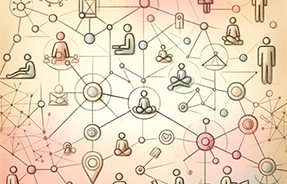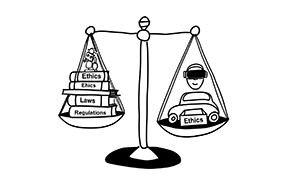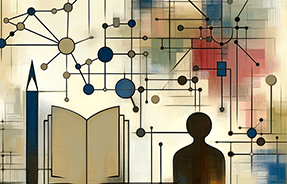
Technology, knowledge, society and human development
A transdisciplinary approach to understanding the human-technology interface.
The School of the Humanities and Social Sciences (HSS) has established a suite of broad thematic groups designed to promote the school’s diverse research activity. HSS Framework initiative aims to foster closer connections between researchers and across disciplines, offer improved avenues of communication and strengthen the environment for collaborative research.
Resulting from an initial consultation and a series of focus groups, six themes emerged under the following working titles. Technology, knowledge, society and human development is one of the six themes and is convened by Steven Watson and is being hosted by the Cambridge Dialogue Educational Dialogue Group (CEDiR) under the auspices of techCEDiR.
The humanities and social sciences bring perspectives on the technology, knowledge, society and human development, which can be explained in terms of theory and concepts but also in relation to lived human experience, practices and individual and group behaviour.
Themes
The following sub-themes have been identified as areas of interest.

Digital revolution and its impact on society
Investigating the effects of the digital revolution on social structures, communication, access to information, privacy, and surveillance, as well as exploring how digital tools are changing the way people learn, work, and interact.

Education and technology
Analysing the use of technology in educational settings, such as online learning platforms, adaptive learning, and artificial intelligence in education, and understanding how these tools can improve learning outcomes and bridge educational gaps.

Technology and inequality
Examining the role of technology in either widening or narrowing social, economic, and digital divides, as well as exploring how to ensure that technological advances benefit marginalized and underprivileged communities.

Health and biotechnology
Investigating the impact of biotechnology and medical advancements on human development, including personalized medicine, genetic engineering, and telemedicine, as well as addressing ethical concerns surrounding these innovations.

Environmental sustainability and green technology
Exploring the role of technology in addressing climate change, promoting environmental conservation, and fostering sustainable development through the adoption of clean energy, waste management, and sustainable agriculture practices.

Ethics and regulation of technology
Assessing the ethical, legal, and social implications of emerging technologies, such as artificial intelligence, autonomous vehicles, and virtual reality, and understanding the need for appropriate regulatory frameworks.

Technological innovation and economic growth
Studying the relationship between technological advancements, economic growth, and job creation, as well as exploring the impact of automation and digitization on labour markets and workforce development.

Digital humanities and social sciences
Exploring how technology can enhance research in the humanities and social sciences through digital archiving, data visualization, and computational analysis, while also examining the potential risks and challenges associated with these methods.
Current progress on the HSS framework theme, Technology, knowledge, society and human development
As of end of February 2024, doctoral candidate, Ms Bo Yu, has been gathering a list of information of groups and individuals whose work is related to the themes of the Technology, knowledge, society and human development sub-themes based entirely on information on the university’s website. From this we will put together a mailing list in order that we can initiate some dialogue about developing this framework theme. From this we are organising events and will develop this web presence further. While we have initiated this project, we are looking to develop this framework theme in a collaborative and participatory way.
If you would like to be involved, or added to the mailing list, please contact us at cedir@educ.cam.ac.uk
Recent events
Cambridge Generative AI in Education Conference 2024
Human-machine collaboration and the expansion of the dialogic space: Addressing the challenges of generative AI integration in education
16th and 17th of October 2024, University of Cambridge
Held at the Hilton Hotel, Cambridge
Updated call for abstracts and registration
Keynote speakers: Professor Wayne Holmes, UCL; Professor Mairead Pratschke, University of Manchester; Professor Rupert Wegerif, University of Cambridge; Professor Jean-Gabriel Ganascia, Sorbonne University.
Conference theme and details
The release of ChatGPT in November 2022 sparked widespread interest in the potential of generative AI technology in education. Despite this enthusiasm, the adoption of generative AI in education, teaching, learning, and research has not yet become widespread. This conference aimed to address the challenges and opportunities presented through the sharing of ideas about integrating generative AI into educational practices and developing generative AI literacy.
What is increasingly becoming a focus around the successful integration of generative AI in education, as well as in other sectors, is the notion of human-machine collaboration and consideration of the expansion of the dialogic space. This means that the way in which humans interact and utilise technologies is likely to be transformed as the use of generative AI becomes increasingly widespread. This extends to the possibility of new kinds of human-machine and human-machine-human collaboration, dialogue, connected intelligence and collaborative decision making. Understanding these transformations, the possibilities, as well as challenges and limitations, invites an interdisciplinary and global approach to research and development.
One significant barrier to widespread adoption is educators’, students’ and learners’ concerns about using generative AI safely, effectively, and ethically while remaining compliant with regulations. Generative AI's sophistication and versatility are continuously evolving and understanding how to integrate it in human-centred ways into existing educational practices requires careful consideration. This presents new challenges that necessitate interdisciplinary, participatory, stakeholder co-designed, iterative, and contextual approaches to research and development.
A further aspect of this conference was to consider global and local inequalities and educational exclusions and consider how generative AI can be used to address such pressing challenges.
This conference brought together experts from various fields to discuss and develop strategies for integrating generative AI in education. Topics included safe and effective use of generative AI tools, ethical considerations, regulatory compliance, and methods for developing generative AI literacy among educators and students. Through collaborative efforts, the conference aimed to foster innovative solutions and best practices for leveraging generative AI to enhance educational outcomes.
Attendees had the opportunity to present and participate in interactive sessions, workshops, and panel discussions led by leading researchers, educators, and industry professionals. The goal was to create a platform for sharing knowledge, experiences, and insights that can inform future practices and policies. By addressing these critical issues, the conference sought to pave the way for a more informed and effective integration of generative AI in education, ultimately contributing to the advancement of teaching, learning, and research in the digital age.
Related seminar series
Society, technology and the human-machine interface – online seminar series, 2024
The escalating prominence of artificial intelligence (AI) in society necessitates a nuanced understanding of technology's role in relation to society and communication. Current theoretical frameworks often adopt an instrumental or deterministic view of technology: they either see technology merely as tools that serve human purposes without significantly influencing social structures (instrumentalism), or they assume that technological development follows a fixed path that inexorably shapes society in specific ways (determinism).
This reductionist approach overlooks the complex, reciprocal interactions between technology and society. The online seminar series aims to transcend these limitations by integrating philosophical, theoretical, and historical sociological perspectives
This seminar series explored the nature of technology and its intricate relationship with individuals and society, highlighting the need for a more sophisticated discourse that acknowledges technology's active role in shaping social dynamics and human communication.
"Technology, Society and the Individual”
The seminar series is also part of the development of a proposal for an edited volume titled "Technology, Society and the Individual”, which explores the theoretical, historical and sociological dimensions of technological systems using inter/transdisciplinary approaches.
The contributors, from diverse disciplines, will engage with topics ranging from cartography and sanitation to artificial intelligence and renewable energy systems, providing a comprehensive examination of the social constructs and characteristics of technology. This volume aims to contribute to the understanding of technology as a social construct, with implications for future research directions.
Seminar 1: Luhmann and Technology
Tuesday 5 March, 13.00-15.00 GMT, online via zoom
This presentation explores the theoretical understanding of technology within the framework of Niklas Luhmann's systems theory.
It begins with a summary of Luhmann's key contributions to the theory of technology, with a particular focus on his technical terms and distinctions. Subsequently, it reflects on how we can expand and adapt Luhmann's considerations to encompass developments within the field of technology that have occurred since his writings. Finally, it presents a proposal for how Luhmann's sociology of technology can be further developed, viewing technology as an independent functional system in modern society.
Speaker
Dr Jesper Tække
Seminar 2: Technology on the Move
Tuesday 2 April, 13.00-15.00 BST, online via zoom
Throughout the millennia, technology developed along the two axis’ of conquering space and time. From the Mongolian steppes to the misty hills of Scotland, the horse evolved to become the most prominent vehicle for technology conquering time in the form of speed. No other animal could transport humans faster and longer than optimized breeds of horses.
The advent of equine technologies to harness and strengthen human abilities to conquer time is a prime example of structural couplings between different species, encoded in social forms, norms and semantics.
In this long evolution of social forms, the anthropological and hippological aspects have been well understood, and even art history has once again caught up with the legacies of the human-equestrian bond (Hunecke 2008; Edwards, Enenkel & Graham 2012; Clausen 2024).
In this presentation, Clausen discusses the value in using the systems theoretical approach to understand the dynamics and co-evolution of societies, in which both humans and horses trot along on the outside of communication. With the example of the advent of the stirrup on the battlefields of late antiquity, he will suggest to understand the horse as a social technology of acceleration with a deep-dive into the last centuries of the Roman empire.
As the onslaught of Mongol riders could navigate more delicately around the Roman formations, Roman legions found themselves in a situation of lost initiative. The reaction time had to be reduced for foot-soldiers, or a similar sort of cavalry to be attached to the late-roman armies. In consequence, the advent of the stirrup changed the late-roman organization as to differentiate between faster and slower response times.
Sociologists have traditionally understood horses as a physical entity, neither partaking in interaction nor being a unique driver of societal forms and norms. The systems theoretical approach to the history of technology changes this fundamental aspect, as it re-considers the link between technology, society and the living and thinking organisms in its close proximity.
As such, delving into the history of equestrian technology opens the floodgates to bringing new insights from the emerging discipline of inter-species communication (Beaver 2019) back into mainstream understanding of societal evolution.
References
- Beaver, B.V. (2019). Equine behavioral medicine, Elsevier Clausen, L. (2024). The systemic challenge and practice of leadership in a post-centaurian society, Systems Research and Behaviorial Science
- Edwards, P., Enenkel, K., Graham, E. (ed.) (2012). The horse as cultural icon, Brill
- Hunecke, V. (2008). Europäische Reitermonumente. Ein Ritt durch die Geschichte Europas von Dante bis Napoleon, Ferdinand Schöningh Verlag
Speaker biography
Lars Clausen is managing director at the Next Society Institute, Kazimieras Simonavicius University and is affiliated with UCL University College, Denmark, teaching on leadership, organization and professionalization.
Clausen is a lead organizer of the annual global conference on social systems theory, in Dubrovnik, Croatia. He specializes in management research from a historical-sociological approach, nested in the tradition of Niklas Luhmann’s systems theory. He has published on diverse topics, not least in the subject of societal transformation of morality, power and management.
Seminar 3: Reframing Technological Displacement of Labour: Insights from Social System Theory
Tuesday 14 May 2024, 13.00-15.00 BST, online via zoom
Approaches to the technological displacement of labour have traditionally been oriented towards critical theory, often overemphasising the cultural or economic aspects of capitalism. These approaches frequently lead to moral judgments of the process.
In contrast, this lecture explores the concept of technological displacement of labour through the lens of Social System Theory, particularly drawing on the work of Niklas Luhmann. It is argued that technology, while viewed as a self-sufficient system, operates within a complex web of social systems, influencing and being influenced by them.
Luhmann's theories of autopoiesis and operational closure serve as the foundation for understanding how organisations, as autopoietic systems, interact with technology. The paper emphasises that technological displacement is not a direct result of technological advancement or monopolised by the capitalist exploitation of labour, but rather the outcome of organizational decisions within the context of their internal and external environments, especially in contemporary organisations.
It challenges traditional views by suggesting that change within organisations stems from their internal dynamics and decision-making processes, rather than from external technological pressures. It contributes to the discourse by highlighting the importance of organisational self-reflection and adaptation in navigating the challenges posed by technological advancements.
Speaker biography
Dr. Erik Brezovec is an Assistant Professor at the University of Zagreb, Faculty of Croatian Studies. Within the Department of Sociology, he is the head of the courses on Sociological Theory II, Contemporary Sociological Theory, Contemporary Social Theory, Phenomenological Sociology, and Sociology of Health and Illness.
His main areas of interest are meta-sociology, sociological theory, and the sociology of knowledge. Utilising his approaches, he studies various areas of social reality; one of his main areas of focus is the social aspects of alcohol consumption in Croatia. He has published over 30 scientific articles and one monograph and has participated in more than 20 conferences.
Seminar 4: Autopoietic Praxis
Tuesday 4 June 2024, 13.00-15.00 BST, online via zoom
Niklas Luhmann’s social systems theory emphasizes the role of communication over action in the constitution of society. He views both social systems and psychic systems as autopoietic, meaning they are self-producing and based on meaning. However, Luhmann does not entirely exclude action from his theory. He incorporates action within his concepts of interpenetration and the role of programs in social systems.
In Luhmann’s framework, interpenetration refers to the mutual influence and interaction between different systems. Actions, though not the primary focus, play a role in this interaction. Programs, in Luhmann’s terms, are structured sets of expectations that guide the operations of social systems. They provide a framework within which actions occur and are understood.
Autopoietic praxis extends Luhmann’s ideas by including human practices, actions, technologies, and programs as self-referentially operationally closed systems. These systems are thermodynamically and informationally open, meaning they exchange energy and information with their environment while maintaining their operational boundaries. This concept seeks to clarify and expand the role of action, practices, programs, and technologies within social systems theory.
The idea of interpenetrative ecology is introduced to provide an integrated approach to understanding the relationships between different types of autopoietic systems: social systems (communication), psychic systems (cognition), praxis, and materiality. These systems are seen as structurally coupled, meaning they interact and influence each other while maintaining their operational closure.
This elaboration aims to enhance our understanding of how practices, actions, embodiment, technology, and the physical world relate to social systems. By considering these elements as autopoietic systems, we can better comprehend their roles and interactions within the broader context of social systems theory.
Speaker biography
Dr Steven Watson is an Associate Professor in the Faculty of Education, University of Cambridge. His research uses transdisciplinary approaches, his current focus is on the philosophy and sociology of technology, and in particular the role of generative AI in education and society. While his research is strongly theoretical, he integrates this with contextual empirical research and development. His previous professions include secondary school mathematics teacher and telecommunications engineer. He holds degrees in Engineering from the University of Cambridge, a Masters in Education from the Open University and a PhD in Education from the University of Nottingham.
